Is It Easy to Uninstall a Dishwasher
How to Replace a Dishwasher in 4 Easy Steps
Updated: Nov. 27, 2018
Our pros tell you how to avoid the most common mistakes on how to replace and how to install a dishwasher.

This step-by-step guide shows you how to pull out your old dishwasher, slide in the new one, and make the new water, drain and electrical connections. All it takes is a few basic tools and a few hours of your time.
You might also like: TBD
- Time
- Complexity
- Cost
- A full day
- Beginner
- Less than $20
Step 1: Getting started on How to Replace a Dishwasher
In most cases, you won't need any special tools or skills to replace or when installing a dishwasher. Most dishwashers are 24 in. wide, so you won't have to alter cabinets to get the new one to fit. (If you change sizes, you'll have to alter your cabinets. This requires more advanced carpentry skills that we won't show here.)
You may find that extra layers of flooring have raised the floor height in front of the old dishwasher. This can make it difficult to remove the old dishwasher and install the new one. In some cases, you have to either loosen the countertop or remove flooring when learning how to hook up a dishwasher. Consider consulting a professional installer if you don't feel confident about the best strategy.
Get a blanket, an old rug or cardboard to protect your floor while you work on how to remove a dishwasher. Gather two adjustable wrenches, a screwdriver, a tape measure, a pair of pliers and a level. You'll also need a shallow pan, bucket, sponge and rag to collect water that'll drain from the lines when you disconnect them.
Turn off the power to the dishwasher at the main panel or unplug it under the sink. Also turn off the water to the dishwasher at the nearest shutoff valve, usually the hot water shutoff under the sink. Or shut it off at the water heater. Consider removing the cabinet doors from your sink base to make disconnecting the drain lines easier as you begin the how to hook up a dishwasher task.
Step 2: Disconnect the electrical cable and water line
The water and electrical connections are underneath the dishwasher, behind a lower front panel that you have to unscrew (Photo 1). Always test with a voltage detector to make sure the power is off. When you remove the electrical line from the box, leave the cable clamp on and reuse it on the new dishwasher(Photo 12). Sometimes dishwashers are plug-and-cord connected rather than "hard wired" as shown in our photos. If so, disconnect the cord and reuse it on the new dishwasher. If it's in bad condition, buy a new one from an appliance dealer.
Usually, the water supply line is flexible copper or braided stainless steel. In either case, remove the nut securing it to the 90-degree fitting on the dishwasher (Photo 2). As long as the nut and ring are in good condition (no nicks or gouges; Photo 11), leave them on the line for later reuse. You can bend the copper line slightly, but take care not to kink the line. If you do, you'll have to replace it. Flexible stainless steel lines are a good replacement. They are available at a hardware store or home center. Make sure you buy them long enough and with fittings that match the old.
Remove the 90-degree fitting for use on the new dishwasher. It's important to orient it exactly the same direction on the new machine so that the water line feeds directly into it. Otherwise you might kink the line.
Sponge out any standing water inside the dishwasher before removing the drain line under the sink. It's the flexible hose that's clamped to an inlet arm on the sink drain or a garbage disposer (Photo 3). As you slide the old dishwasher out, you'll have to simultaneously work the drain hose back through the hole in the sink cabinet. Keep a rag handy to wipe up the water that'll run out of the line.
Lowering the dishwasher gives you more clearance to slide the dishwasher out. Chances are the leveling feet will be difficult to turn, but a shot of penetrating oil on the threads may make it easier. If you need more clearance, cut the feet off with a hacksaw blade and turn the screw out. Then be sure to slip cardboard or a rug under them to avoid gouging your floor when you pull out the dishwasher.
Step 3: Installing a Dishwasher: Prep the new dishwasher
For how to install a dishwasher, uncrate the new dishwasher according to the instructions in the box. Once it's uncrated, you'll find the manuals and dishwasher installation instructions on how to install a dishwasher inside the dishwasher. Review how to install a dishwasher before proceeding; the instructions may differ slightly from the details we show.
Tip the dishwasher on its back and attach the 90-degree fitting (Photo 5). Don't reuse your old drain hose; the dishwasher will come with a new one. To prevent sink clogs from flooding the dishwasher, be sure to loop the flexible drain line all the way up to the bottom of the countertop (Photo 6). Some plumbing codes require a special air gap fitting in the drain line. Call your local plumbing inspector to find out the rules on how to install a dishwasher.
The manual will tell you how to replace a dishwasher and adjust the leveling feet and/or wheels to fit the height of the opening. It's easiest to set these before sliding in the dishwasher. Make minor adjustments after the dishwasher installation. But if your kitchen floor is built up (higher than the area where the dishwasher sits), you'll have to adjust the feet after you slide it into the opening. If your dishwasher is equipped with rear wheels without adjusters in the back, you may have to set shims (Photo 7) to raise the back to the height of the finished floor. Tack them to the floor so they don't shake loose when the dishwasher runs.
Step 4: How to hook up a dishwasher and reconnect it
For how to install a dishwasher, slide the new dishwasher in (Photo 8), grasping it by the sides to avoid denting the front panel. Set the dishwasher in position according to Photos 9 and 10. But don't secure it to the countertop yet. Wait until you make all connections and adjustments.
How to install a dishwasher involves connecting the copper water line so it doesn't leak can be tricky. The secret is to align it so it slides straight into the threaded part of the elbow (Photo 11). If it's cocked to one side, the compression nut won't thread on right and it'll leak. If necessary, turn the elbow on the dishwasher slightly with a wrench to align it, or gently bend copper lines about 8 to 12 in. from the end.
With the dishwasher water supply line, the electrical cable and drain connected, turn the power and water back on and check for leaks. Recheck the positioning, then screw the dishwasher to the countertop (some screw to the cabinet sides). If your countertop is a synthetic material or stone, and the old holes don't line up, follow the directions listed in the manual on how to install a dishwasher.
Caution
If you have aluminum wiring, call in a licensed electrician who's certified to work with it. This wiring is dull gray, not the dull orange that's characteristic of copper.
Required Tools for this Dishwasher Installation Project
Have the necessary tools for this DIY project on how to install a new dishwasher lined up before you start—you'll save time and frustration.
Required Materials for this How to Install a Dishwasher Project
Avoid last-minute shopping trips on how to install a dishwasher by having all your materials ready ahead of time. Here's a list.
Originally Published: November 27, 2018
stclairhowits1990.blogspot.com
Source: https://www.familyhandyman.com/project/how-to-replace-a-dishwasher/












0 Response to "Is It Easy to Uninstall a Dishwasher"
Post a Comment